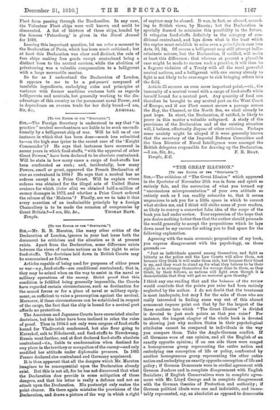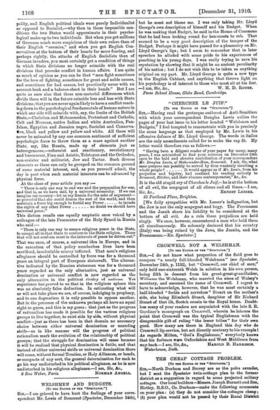"THE GREAT ILLUSION."
[To TEE EDITOR Or TEE "SPECTATOR."] SIR,—The criticism of " The Great Illusion " which appeared in the Spectator of November 26th was in form and spirit so entirely fair, and the correction of what you termed my " unconscious misrepresentation" of your own attitude so
entirely such as I can readily subscribe to, that it seems ungracious to ask you for a little space in which to correct what strikes me, and I think will strike some of your readers, as likely to convey a somewhat false idea of the scope of the book you had under review. Your expression of the hope that you desire nothing better than that the author should persuade
the world generally to accept the propositions which he lays down must be my excuse for asking you to find space for the following explanation.
Agreeing with the main economic propositions of my book, you express disagreement with the psychology, on these grounds :- "Just as individuals quarrel among themselves, and fight as bitterly as the police and the Law Courts will allow them, not because they think it will make them rich, but because their blood is up, and they want to stand up for what they believe to be their rights, or to revenge themselves for wrongs done to them, as they think, by their fellows, so nations will fight even though it is demonstrable that they will get no material gain thereby."
I think any one reading that and the bals.noe of the review would conclude that the points you raise had been entirely neglected by the author. I do not doubt that the treatment is most inadequate, but may I for the sake of those who are really interested in finding some way out of this absurd armament impasse point out that by far the largest of the three sections into which " The Great Illusion " is divided is devoted to just such points as that you raise P For instance, the longest chapter of the whole book is devoted to showing just why modern States in their psychological attributes cannot be compared to individuals in the way you compare them. Take the Anglo-German conflict. If all Germans were of one opinion, and all the English of an exactly opposite opinion; if on one side there were ranged a homogeneous group representing the entire nation and embodying one conception of life or policy, confronted by another homogeneous group representing the other entire nation and embodying an exactly opposite conception of life and policy ; if German Democrats were in cordial agreement with German Junkers and in complete disagreement with English Socialists ; if English Conservatives were in complete agree- ment with Mr. Lloyd George and in complete disagreement with the German theories of Protection and authority ; if German political ideals were one and indivisible, and immu- tably represented, say, an absolutist as opposed to democratic
polity, and English political ideals were purely Individualist as opposed to Socialist,—why then in these impossible con- ditions the two States would approximate in their psycho- logical make-up to two individuals. But when you get millions of Germans much more suspicious of their own rulers than of their English " enemies," and when you get English Con- servatives at the bottom of their hearts far more fearing, and perhaps rightly, the attacks of English Socialists than of German invaders, you most certainly get a condition of things in which State divisions no longer coincide with the real divisions that provoke conflict in human affairs. I am quite as much of opinion as you can be that "men fight sometimes for the love of fighting, sometimes for great and noble causes, and sometimes for bad causes, but practically never with an account-book and a balance-sheet in their hands." But I am quite as sure also that these non-material differences which divide them will in the future coincide less and less with State divisions; t hat you are never again likely to have a conflict reach- ing down to the psychological fundamentals of human nature in which one side will coincide with, say, the limits of the British State,—Christian and Mohammedan, Protestant and Catholic,
Celt and Norman, native Indian and white Australian, Pan- Islam, Egyptian and Jamaica negro, Socialist and Conserva- tive, black and yellow and yellow and white. All these will
never be animated by any one common sentiment of sufficient psychologic force to throw them as a mass against another State, say, like Russia, made up of elements just as heterogeneous,—reformist and reactionary, revolutionary and bureaucrat, Finn and Asiatic, Tolstoyan and the Orthodox, non-resister and militarist, Jew and Tartar. Such diverse elements as these can only be grouped on the common ground of some material interest, and, as you yourself admit, the day is past when such material interests can be advanced by physical force.
At the close of your article you say :—
" There is only one way to end war and the preparation for war, and that is, as we have said, by a universal monarchy. If we can imagine one country—let us say Russia for the sake of argument— so powerful that she could disarm the rest of the world, and then
maintain a force big enough to forbid any Power to invade the rights of any other Power no doubt we should have
universal peace."
This dictum recalls one equally emphatic once voiced by a
colleague of the late Procurator of the Holy Synod in Russia
who said:— "There is only one way to ensure religious peace in the State, to compel all in that State to conform to the State religion. Those that will not conform must in the interests of peace be driven out."
That was once, of course, a universal idea in Europe, and in the execution of that policy numberless lives have been sacrificed, incalculable misery inflicted. That men's religious allegiance should be controlled by force was for a thousand years an integral part of European statecraft. The alterna- tive indicated by the Russian statesman was for a thousand years regarded as the only alternative, just as universal domination or universal conflict is now regarded as the only alternative in the political rivalry of nations. Yet experience has proved to us that in the religious sphere this
was an absolutely false deduction. In estimating what will or will not take place we are, of course, indulging in prophecy, and to one dogmatism it is only possible to oppose another. But in the presence of the unknown perhaps all have an equal right to guess, and this is my guess : that just as the progress of rationalism has made it possible for the various religious groups to live together, to exist side by side, without physical conflict—just as there has been in that domain no necessary choice between either universal domination or unending strife—so in like manner will the progress of political rationalism mark the evolution of the relationship of political groups; that the struggle for domination will cease because it will be realised that physical domination is futile, and that instead of either universal strife or universal domination there
will come, without formal Treaties, or Holy Alliances, or bonds, or compacts of any sort., the general determination for each to go his way undisturbed in his political allegiance, as he is now undisturbed in his religious allegiance.—I am, Sir, &c.,







































 Previous page
Previous page